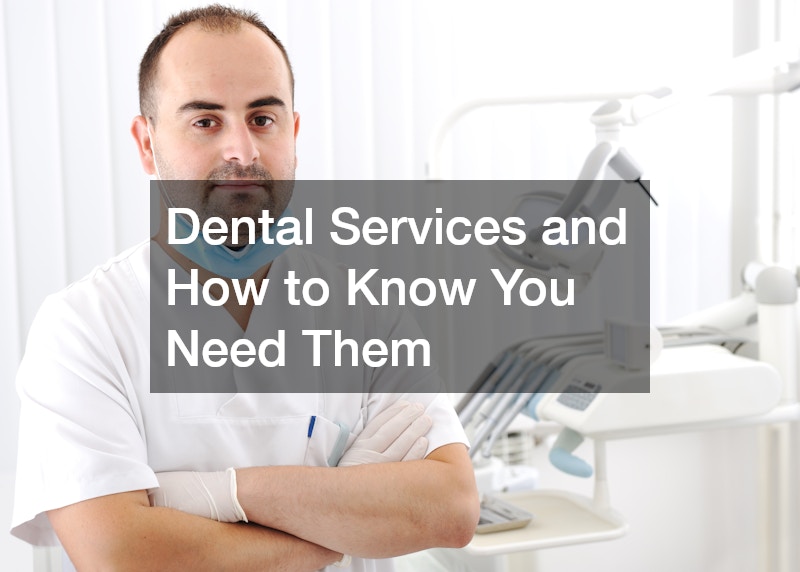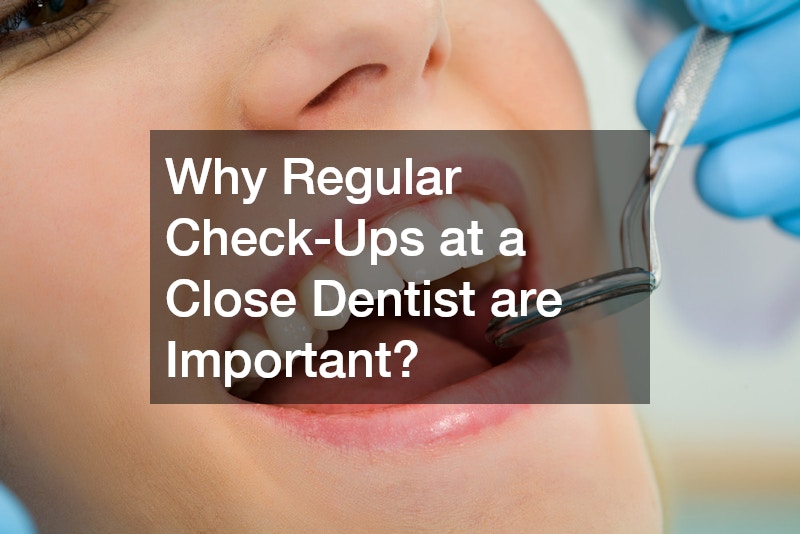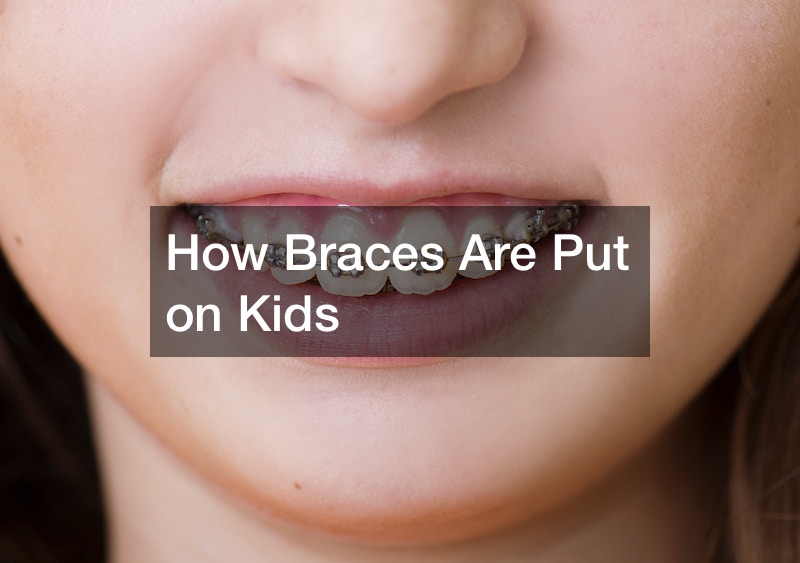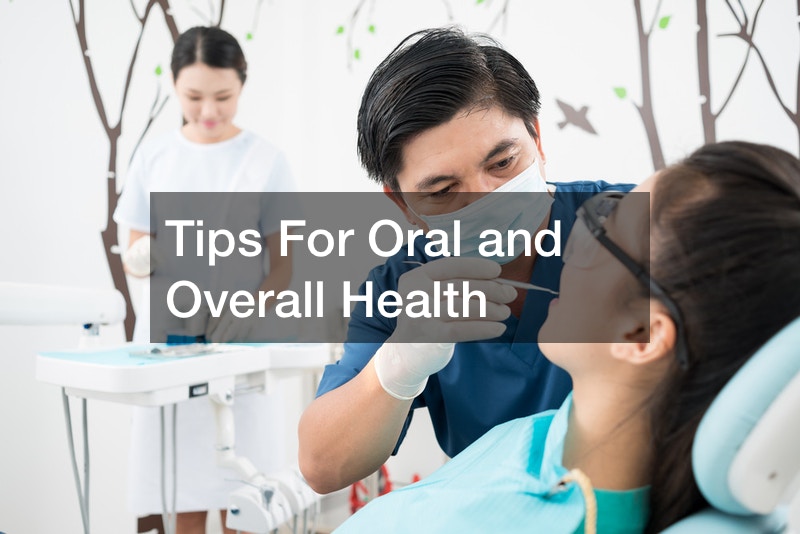
Dental Services and How to Know You Need Them

Dental health is a cornerstone of overall well-being, yet many people tend to overlook it until a serious issue arises. Whether you’re in need of preventative care, urgent treatment, or cosmetic enhancements, understanding the importance of dental services and recognizing when you need them can dramatically improve your oral health. This article provides a comprehensive guide on various dental services and how to determine if you require them.
What Are Common Dental Services?

Dental care encompasses a broad range of services designed to maintain and improve the health of your teeth, gums, and mouth. Understanding the different types of dental services available and when you may need them is key to keeping your smile healthy and beautiful.
General Dentistry Services
General dentistry refers to the primary and preventative services provided by family dentists or a general dental office. These services include regular check-ups, teeth cleaning, and dental exams, which are all crucial for maintaining long-term oral health. Teeth cleaning removes plaque and tartar buildup, preventing gum disease and cavities. During an exam, your dentist will assess your oral health, screen for any potential issues like cavities, and check for early signs of oral diseases, including gum disease and oral cancer. Preventative care also includes fluoride treatments, sealants, and routine monitoring to ensure that your teeth remain strong and free from decay.
Cosmetic Dentistry Services
Cosmetic dentistry is a branch of dental care focused on improving the appearance of your smile. Procedures like teeth whitening, veneers, and dental bonding can enhance the color, shape, and alignment of your teeth, giving you a more attractive smile. Many people seek the expertise of a cosmetic dentist to address aesthetic concerns such as stained or misaligned teeth. A cosmetic dentist specializes in using various techniques to create a beautiful smile that complements your face and personality. Whether it’s through teeth whitening or custom dental veneers, cosmetic dentistry can provide noticeable results that improve your self-esteem and confidence.
Emergency Dental Services
Dental emergencies happen when you least expect them, and being prepared for these situations can help minimize pain and prevent further damage. Emergency dental services address urgent issues such as severe toothaches, broken or knocked-out teeth, and oral infections. Experienced dentists are trained to handle these situations quickly, ensuring that you receive immediate care. If you experience sudden pain, swelling, or trauma to the mouth, it’s essential to seek professional help from a local dental office to prevent complications.
How to Know You Need a Close Dentist for Emergency Care?
Knowing when you need emergency dental care can be the difference between saving or losing a tooth. Recognizing severe symptoms and knowing when to seek help can help you address problems as quickly as possible.
Recognizing Severe Tooth Pain
Tooth pain can stem from a variety of causes, but if the pain is intense or persistent, it may indicate an infection or a serious dental issue like a cavity or abscess. If you’re experiencing toothaches that interfere with your daily activities, it’s crucial to visit a local dental office as soon as possible. Delaying treatment can lead to more severe consequences, including tooth loss.
An experienced dentist can identify the underlying cause of your pain and recommend appropriate treatment, whether it’s a root canal, filling, or other intervention. In the case of an abscess, the infection can spread and cause systemic health problems, so prompt care is essential.
Swelling and Infections
Swelling in the gums or around the face may indicate a dental infection that requires immediate attention. Infections can spread quickly and cause serious health issues if not treated promptly. If you notice swelling, especially if it’s accompanied by fever or an unpleasant taste in the mouth, contact your local dental office immediately. An untreated infection can result in the need for tooth extraction or more invasive treatments.
Handling Knocked-Out Teeth
Accidents happen, and teeth can sometimes be knocked out or chipped. If a tooth is knocked out, the most important thing is to act quickly. First, find the tooth, and handle it by the crown, not the root. Rinse the tooth gently and place it back into its socket if possible, or store it in a container of milk and seek immediate care from your experienced dentist. The sooner you see a dentist, the higher the likelihood that the tooth can be reattached successfully.
Why Regular Check-Ups at a Close Dentist are Important?

Regular dental visits are essential for maintaining optimal oral health and preventing future problems. These visits allow your dentist to monitor your teeth and gums for early signs of decay, disease, or other issues, ensuring that any necessary treatments can be administered before the problems become more severe.
Preventing Dental Diseases
Routine visits to a local dental office are key to preventing oral diseases like gum disease, cavities, and even oral cancer. During your appointment, your dentist will conduct a thorough examination, including X-rays if necessary, to check for early warning signs. Catching these issues early means they can be treated before they progress into something more serious.
Monitoring Oral Health
In addition to disease prevention, regular check-ups help monitor the condition of your teeth and gums. Your dentist can track changes in your oral health over time and make recommendations for maintaining or improving it. Whether you need more frequent cleanings, fluoride treatments, or specific care for sensitive teeth, your local dental office is the best place to stay on top of your oral health needs.
Building a Relationship with Your Dentist
One of the key benefits of consistent visits to the same family dentist is the relationship you develop over time. As your dentist gets to know you, they can offer more personalized care and better anticipate your needs. This connection makes it easier to address any concerns you might have about your oral health, treatment options, or dental anxiety. A trusted family dentist who understands your medical history can provide more effective and tailored care.
What to Expect During a Routine Dental Visit?
A routine visit to the dentist involves several steps, all designed to ensure your teeth remain healthy and free from issues. Understanding what to expect can help reduce anxiety and make your visits more comfortable.
The Initial Consultation
During the first visit, your family dentist will take a complete medical and dental history, and conduct a thorough examination of your mouth. This visit provides a foundation for future care, as it helps your dentist understand your specific needs, any dental concerns, and your goals for treatment. If this is your first time at a new dental office, be prepared to discuss your health conditions and medications.
Examination and Cleaning Procedures
A typical dental visit includes an examination to check for cavities, gum disease, and other potential issues. Your hygienist will also perform a teeth cleaning, which involves removing plaque and tartar buildup from your teeth, ensuring that your gums stay healthy and that your teeth remain clean. This cleaning prevents the development of cavities and gum disease, both of which can lead to more serious complications.
Aftercare and Recommendations
After your exam and cleaning, your dentist may provide recommendations based on the findings from your visit. This could include advice on brushing and flossing techniques, dietary suggestions to protect your teeth, or further treatments such as fluoride treatments, sealants, or cosmetic procedures like teeth whitening. If your dentist detects any issues, they’ll work with you to create a treatment plan that addresses your needs.
How Can a Close Dentist Help with Cosmetic Dentistry?

For those who want to enhance the appearance of their smile, cosmetic dentistry offers a variety of solutions. Whether you’re dealing with discolored, crooked, or missing teeth, cosmetic dentistry can restore both the function and appearance of your teeth.
Types of Cosmetic Procedures Offered
Some of the most popular cosmetic procedures include teeth whitening, veneers, crowns, and dental implants. Teeth whitening can dramatically improve the color of your teeth, especially if they’ve become stained due to food, drinks, or smoking. Veneers and crowns can cover imperfections in your teeth, while dental implants are a long-term solution for missing teeth. A cosmetic dentist will guide you in choosing the right treatment based on your specific needs and goals.
Determining the Right Cosmetic Treatment for You
Choosing the right cosmetic procedure depends on your oral health, goals, and preferences. For instance, teeth whitening is ideal for improving the color of your teeth but may not be suitable for all types of discoloration. Veneers can be a good option for addressing uneven or chipped teeth, while dental implants are more appropriate for missing teeth. Your cosmetic dentist will help you evaluate the options and determine the best treatment for you.
Long-Term Benefits of Cosmetic Dentistry
Investing in cosmetic dentistry offers long-term benefits, not just in appearance but in self-esteem. When you feel good about your smile, it can boost your confidence and even improve your personal and professional relationships. The results of cosmetic procedures like teeth whitening and veneers can last for years, making them a worthwhile investment in your oral health and overall happiness.
How Do I Choose the Right Dentist?
Finding the right dentist for your needs is a crucial step toward maintaining your oral health. Whether you’re seeking a pediatric dentist, a family dentist, or a cosmetic dentist, there are a few steps you can take to make an informed decision.
Researching Available Options
Start by researching dentists near you, checking their specialties, and reading patient reviews. Many dentists have websites or online profiles that provide valuable information about their services, qualifications, and patient feedback. Look for a local dental office that offers the services you need, whether it’s routine care, orthodontic treatment, or cosmetic enhancements.
Checking Credentials and Reviews
Before choosing a dentist, ensure they are licensed and board-certified. You can also check reviews from other patients to get a sense of the dentist’s approach, bedside manner, and treatment outcomes. This can give you confidence in the quality of care you’ll receive.
Scheduling Consultations
Most dentists offer consultations, which can be a great opportunity to meet the team, ask questions, and get a feel for the office environment. During the consultation, ask about their experience with specific treatments, such as pediatric dentistry or orthodontic care, and make sure you feel comfortable with their approach.
What Role Does a Close Dentist Play in Orthodontics?

Orthodontic care plays a critical role in aligning teeth and correcting bite issues, improving both function and appearance. If you or your child need braces or aligners, your local dental office can be a good starting point for treatment.
Types of Orthodontic Treatments
Common orthodontic treatments include traditional braces, clear aligners like Invisalign, and retainers. Orthodontic care aims to straighten teeth and correct bite problems, such as overbite or underbite. Your experienced dentist can help guide you through the process, explaining the benefits of each treatment and how long the process will take.
When to Consider Orthodontic Care
Orthodontic treatment is typically recommended during childhood or adolescence, but adults can also benefit from orthodontic care. Signs that you may need orthodontic care include crooked teeth, difficulty chewing or biting, and jaw pain. Early evaluation is key, as it allows your dentist to detect potential issues and create a plan for treatment.
Benefits of Early Orthodontic Evaluation
The earlier you seek orthodontic care, the better the outcome is likely to be. Early evaluations help detect alignment issues early on, which can lead to less complex and shorter treatments. Your local dental lab can help craft customized braces or aligners that fit your unique dental structure.
How to Manage Dental Anxiety at a Close Dentist?
Dental anxiety is a common issue for many people, but it shouldn’t keep you from receiving the care you need. Open communication with your dentist can help alleviate fears and ensure that you feel comfortable during visits.
Understanding Dental Anxiety and Common Triggers
Common triggers of dental anxiety include fear of pain, previous negative experiences, and concerns about the dentist’s judgment. Understanding these triggers can help you and your dentist address them appropriately, leading to a more comfortable experience.
Techniques to Ease Anxiety
Techniques like deep breathing, listening to music, or using sedation dentistry can help ease anxiety. Your family dentist may also offer tailored solutions to make your visit more relaxing, ensuring you receive the care you need without fear.
Communicating with Your Dentist about Anxiety
It’s essential to communicate openly with your dentist about your anxiety. Let them know what makes you nervous so they can adjust their approach to help you feel more comfortable.
How Can Preventative Care from a Close Dentist Improve Oral Health?
Preventative care is a key factor in maintaining good oral health and preventing long-term problems. Regular visits to a local dental office for teeth cleaning, exams, and fluoride treatments can ensure that any potential issues are caught early, saving you from needing more invasive treatments later.
Importance of Routine Cleanings
Routine teeth cleaning removes plaque and tartar buildup, preventing cavities and gum disease. Regular cleanings, along with exams, help ensure your teeth remain healthy and that any issues are detected early.
Fluoride Treatments and Sealants
Fluoride treatments help strengthen your teeth and prevent cavities, while sealants protect the surface of your molars from decay. These treatments are essential in maintaining optimal oral health and preventing future problems.
Customized Home Care Recommendations
Your dentist will also provide personalized recommendations for brushing, flossing, and caring for your teeth at home. Tailored advice ensures that you’re doing everything you can to maintain your smile.
What Should I Do in Case of a Dental Emergency Before Seeing a Dentist?
While waiting to see a dentist, certain steps can help alleviate pain and prevent further damage.
Immediate Steps for Common Emergencies
For common dental emergencies like a toothache, rinse your mouth with warm water and use over-the-counter pain relievers to ease discomfort. For a knocked-out tooth, handle it carefully and contact your dentist immediately.
Handling Toothaches and Abscesses
If you suspect an abscess, avoid squeezing it and seek professional care as soon as possible. The dentist will drain the infection and prescribe antibiotics to prevent it from spreading.
When to Call Your Close Dentist
It’s important to contact your local dental office immediately if you experience significant pain, swelling, or trauma. This ensures that you receive timely treatment to prevent further complications.
Conclusion
Maintaining regular dental visits and understanding the different types of dental services can ensure long-term oral health. Whether you need cosmetic dentistry, pediatric dentist services, orthodontic care, or routine teeth cleaning, knowing when to seek specific services helps in addressing dental issues effectively and swiftly. Keep your smile healthy by regularly visiting your trusted local dental office and an experienced dentist who understands your needs.


